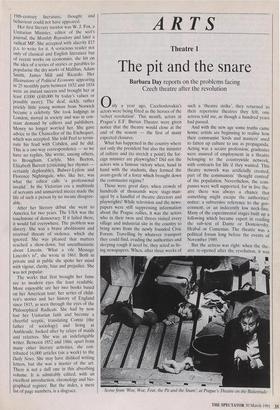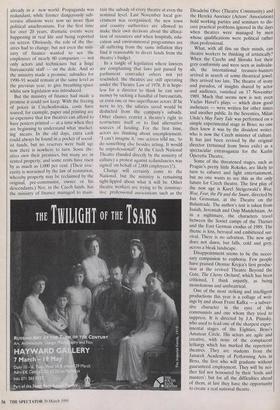ARTS
Theatre 1
The pit and the snare
Only a year ago, Czechoslovakia's actors were being feted as the heroes of the `velvet revolution'. This month, actors at Prague's E.F. Burian Theatre were given notice that the theatre would close at the end of the season — the first of many expected closures.
What has happened in the country where not only the president but also the minister of culture and (to stretch a point) the for- eign minister are playwrights? Did not the actors win a famous victory when, hand in hand with the students, they formed the avant-garde of a force which brought down the communist regime?
Those were great days, when crowds of hundreds of thousands were stage-man- aged by a handful of theatre directors and playwrights! While television and the news- papers were still suppressing information about the Prague rallies, it was the actors who in their twos and threes visited every village and industrial site in the country to bring news from the newly founded Civic Forum. Travelling by whatever transport they could find, evading the authorities and sleeping rough if need be, they acted as liv- ing newspapers. When, after three weeks of such a 'theatre strike', they returned to their repertoire theatres they felt, one actress told me, as though a hundred years had passed.
And with the new age some truths came home; artists are beginning to realise how their communist 'lords and masters' used to fatten up culture to use as propaganda. Acting was a secure profession; graduates were assured of employment in a theatre belonging to the countrywide network, with contracts for life if they wanted. This theatre network was artificially created, part of the communists' thought control' of the population. Nevertheless, the com- panies were well supported, for in live the- atre there was always a chance that something might escape the authorities' notice: a subversive reference to the gov- ernment, or an indecently low neck-line. Many of the experimental stages built up a following which became expert in reading the sub-text of Dante or Dostoievsky, Hrabal or Comenius. The theatre was a political forum long before the events of November 1989.
But the actress was right: when the the- atre re-opened after the revolution, it was already in a new world. Propaganda was redundant, while former dangerously sub- versive allusions were now no more than political anachronisms. For the first time for over 20 years, dramatic events were happening in real life and being reported on screen. Obviously, the role of the the- atres had to change; but not even the min- istry of finance wanted to see the employees of nearly 80 companies — not only actors and technicians but a huge bureaucratic staff — on the dole. And so the ministry made a promise: subsidies for 1990-91 would remain at the same level as the previous year, to give breathing-space whilst new legislation was introduced.
But the ministry of finance had made a promise it could not keep. With the freeing of prices in Czechoslovakia, costs have soared; for example, paper and printing are so expensive that few theatres can afford to have posters printed — at a time when they are beginning to understand what 'market- ing' means. In the old days, extra cash could always be found in a pocket of social- ist funds, but no reserves were built up; now there is nowhere to turn. Some the- atres own their premises, but many arc in rented property; and some rents have risen by as much as 1,000 per cent. (Their inse- curity is worsened by the law of restitution, whereby property may be reclaimed by the original, pre-communist, owner or his descendants.) Nor, in the Czech lands, has the ministry of finance managed to main-
tain the subsidy of every theatre at even the nominal level. Last November local gov- ernment was reorganised; the new town and country authorities are allowed to make their own decisons about the alloca- tion of resources and when hospitals, edu- cation and environmental programmes are all suffering from the same inflation they find it reasonable to divert funds from the theatre's budget.
In a tangle of legislation where lawyers are complaining that laws just passed by parliament contradict others not yet rescinded, the theatres are still operating under the Theatre Law of 1978. It is hope- less for a director to think he can save money by sacking a handful of bureaucrats, or even one or two superfluous actors. If he were to try, the salaries saved would be deducted from the company's subsidy. Other clauses restrict a theatre's right to restructure itself or to find alternative sources of funding. For the first time, actors are thinking about unemployment. "I can't imagine it,' one actress tcild me, 'to do something else besides acting. It would be unprofessional!' At the Czech National Theatre (funded directly by the ministry of culture) a protest against redundancies was signed on behalf of 2,000 employees'(!).
Change will certainly come to the National, but the ministry is remaining tight-lipped about what it will be. Other theatre workers are trying to be construc- tive: professional associations such as the Divadelni Obec (Theatre Community) and the Hereka Asociace (Actors' Association) hold working parties and seminars to dis- cuss practical problems ignored in the days when theatres were managed by men whose qualifications were political rather than professional.
What, with all this on their minds, can theatre workers be thinking of artistically? When the Czechs and Slovaks lost their grey conformity and were seen as individu- als, the international treasure-hunters arrived in search of some theatrical jewel; they arrived too late. The theatre of irony and paradox, of insights shared by actor and audience, vanished on 17 November 1989. Much that seems new is not; even Vaclav Havel's plays — which draw good audiences — were written for other times and another public. In the Seventies, Milan Uhde's May Fairy Tale was performed on a simple experimental stage in Brno; no one then knew it was by the dissident writer, who is now the Czech minister of culture. It has just been revived by the original director (returned from Swiss exile) as a spectacular extravaganza for the Karlin Operetta Theatre.
Some of the threatened stages, such as Prague's pretty little Rokoko, are likely to turn to cabaret and light entertainment, but no one wants to see this as the only future for Czech theatre. The first play of the new age is Karel Steigerwald's Woe, Woe, Fear, the Pit and the Snare, directed by Jan Grossman, at the Theatre on the Balustrade. The author's text is taken from Isaiah, Jeremiah and Osip Mandelstam. As in a nightmare, the characters travel between the Soviet camps of the Thirties and the East German exodus of 1989. The theme is loss, betrayal and embittered sur- vival. There is no salvation. The new age does not dawn, but falls, cold and grey, across a bleak landscape. Disappointment seems to be the neces- sary companion to euphoria. Few people have praised Otomar Krejca's first produc- tion at the revived Theatre Beyond the Gate, The Cherry Orchard, which has been criticised, I think unjustly, as being monotonous and untheatrical.
One of the most striking and intelligent productions this year is a collage of writ- ings by and about Franz Kafka — a subver- sive character in the eyes of the communists and one whom they tried to suppress. It is directed by J.A. Pitinsky, who used to lead one of the sharpest exper- imental stages of the Eighties, Brno's Amateur Circle. His actors are agile and creative, with none of the complacent lethargy which has marked the repertoire theatres. They are students from the Janacek Academy of Performing Arts in Brno, the first who will graduate without guaranteed employment. They will be nei- ther fed nor honoured by their 'lords and masters'; but for all the difficulties ahead of them, at last they have the opportunity to create a real national theatre.



















































 Previous page
Previous page